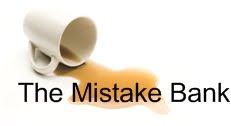[This post first appeared in the
Rocket Matter blog.]
I's customary, when you are in a competitive bidding process, to hold a post-mortem or an "after-action review" if you've lost. And this makes sense: lessons from failure
make a deep imprint. Losing takes a psychological toll and causes us to seek not to repeat it. So the loss review is a natural outgrowth of this feeling – let’s look back on what we did that contributed to the loss and learn from it.
What happens when you win? Here’s what I’ve seen after winning a deal:
- you bang a gong
- you have a party
- you talk about how smart and clever you were
Celebrating wins is essential and motivating, and you should definitely do that. But when the champagne bottles are empty and the euphoria has died down a bit, think for a minute. Did you do everything perfectly?
“Of course not,” you say. “There are things to learn from every competition, win or lose.” And if you reflect on your win, you’ll realize that the victory was at least partially due to circumstances outside your own actions – the mistakes of your opponents, a sympathetic judge, a convenient venue, etc. You may in fact have won in spite of yourself.
If you only look back at the losses, you are discarding massive opportunities to learn.
Perhaps it’s time to start conducting win reviews. Here’s how:
- A few weeks after the result is known, ask each person involved in the case to think about the entire process, from start to finish. Ask them to look for surprises. When were you surprised during the time we were working on the case? What happened? What would you do differently next time?
- Gather everyone together in a meeting (2 hours should be plenty of time). Appoint someone who was not involved in the case to moderate the session. Record it if possible.
- Acknowledge the victory and spend 10 minutes reliving the triumph. Then move into learning mode.
- Set the stage by discussing how much of winning and losing are events outside of your control. “You know, we had a few breaks in this case. If this or that had happened differently, we might have lost. Now, let’s think about what we did that next time we could do better and give ourselves an even better chance to win.”
- Ask each attendee to briefly describe one of their “surprises.” Only that person speaks; this is not a debate, or a competition. Go around the table a few times until you have a list of 10 or more things you’d do differently. [Make sure to listen carefully to the quiet folks; they will have great ideas that you hadn’t considered before.]
- Use a voting method to select the top 3-5 items.
- Spend 30 minutes discussing each of the top items from the vantage point of, “The next time we face this situation, what do we want to do instead?”
- Document those findings and share with the entire company.
It may be difficult to find the time to do a win review. Even harder is gathering the will to reflect on the past and learn from it. But if you want to be better than your opponents, you will make it happen.
I learned as an athlete — I rowed for four years in college — that you have to be present in the moment, and you can’t be distracted by something you just did that was really good, or by the fact that you’re a little bit behind in a race. You can’t focus on what’s just happened because you can’t change it. That’s not to say we shouldn’t pause and congratulate ourselves, but you have to balance that with maintaining focus on what the next steps are. You learn as an athlete to say: “Great, we won that race, but what are the things we could have done better? Because we have a race next week.”
You too will have a “race next week.” How will you prepare? Let us know in the comments.



